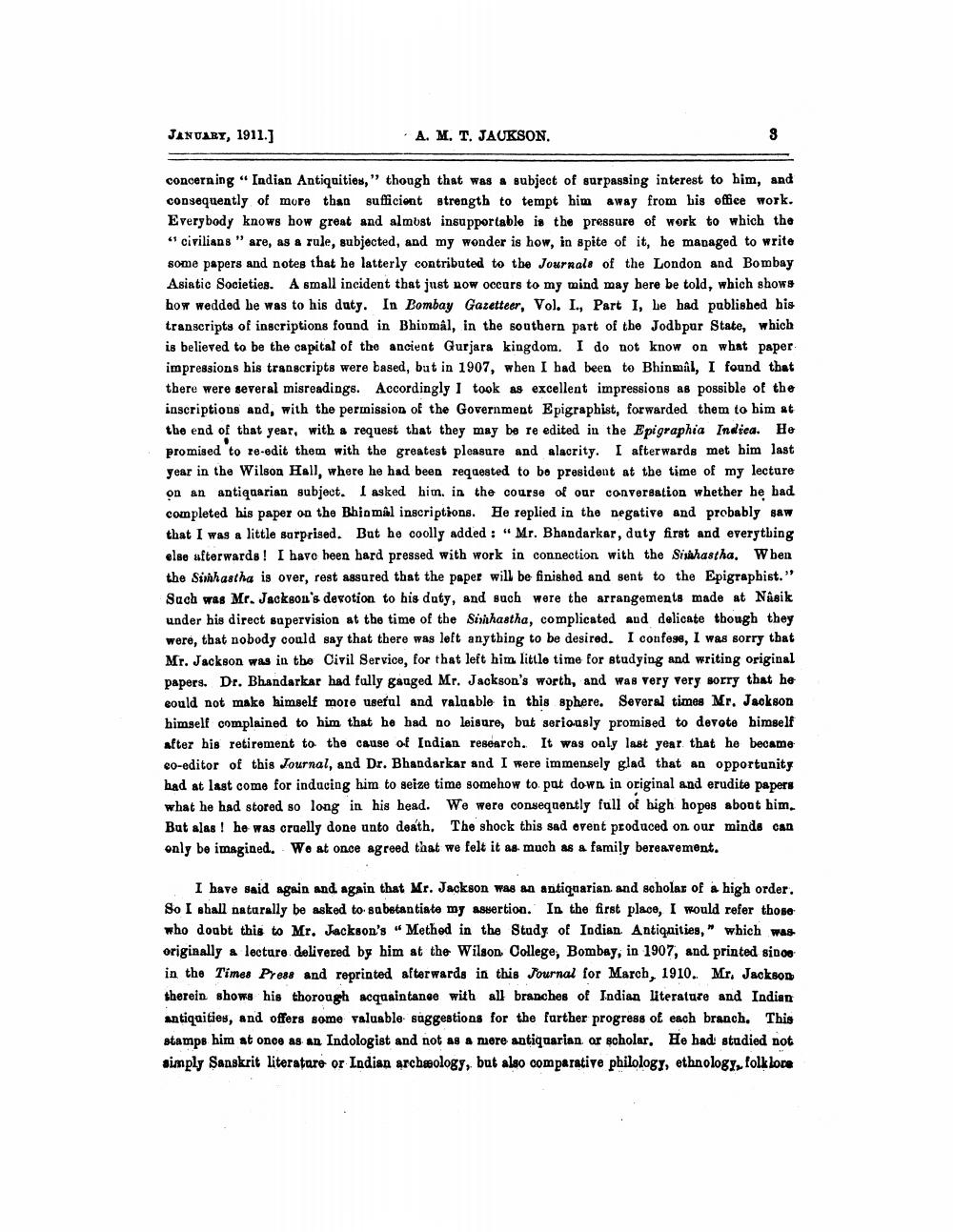Book Title: Indian Antiquary Vol 40 Author(s): Richard Carnac Temple, Devadatta Ramkrishna Bhandarkar Publisher: Swati Publications View full book textPage 9
________________ JANUARY, 1911.) · A. M. T. JAUKSON. concerning Indian Antiquities," though that was a subject of surpassing interest to him, and consequently of more than sufficient strength to tempt him away from his office work. Everybody knows how great and almost insupportable is the pressure of work to which the "civilians" are, as a rule, subjected, and my wonder is how, in spite of it, he managed to write some papers and notes that he latterly contributed to the Journals of the London and Bombay Asiatic Societies. A small incident that just now occurs to my mind may here be told, which shows how wedded he was to his duty. In Bombay Gazetteer, Vol. I., Part I, Le bad published his transcripts of inscriptions found in Bhinmal, in the southern part of the Jodhpur State, which is believed to be the capital of the ancient Gurjara kingdom. I do not know on what paper impressions his transcripts were based, but in 1907, when I had been to Bhinmal, I found that there were several misreadings. Accordingly I took as excellent impressions as possible of the inscriptions and, with the permission of the Government Epigraphist, forwarded them to him at the end of that year, with a request that they may be re edited in the Epigraphia Indica. He promised to re-edit them with the greatest pleasure and alacrity. I afterwards met bim last year in the Wilson Hall, where he had been requested to be president at the time of my lecture on an antiqgarian subject. I asked him in the course of our conversation whether he had completed his paper on the Bhiomål inscriptions. He replied in the negative and probably saw that I was a little surprised. But he coolly added : " Mr. Bhandarkar, duty first and everything else afterwards ! I have been hard pressed with work in connection with the Sirahastha. When the Sinhastha is over, rest assured that the paper will be finished and sent to the Epigraphist.” Such was Mr. Jackson's devotion to his daty, and such were the arrangements made at Nasik under his direct supervision at the time of the Sirahastha, complicated and delicate though they were, that nobody could say that there was left anything to be desired. I confese, I was sorry that Mr. Jackson was in the Civil Service, for that left him little time for studying and writing original papers. Dr. Bhandarkar had fally gauged Mr. Jackson's worth, and was very very sorry that he could not make himself more useful and valuable in this sphere. Several times Mr. Jackson himself complained to him that he had no leisure, but seriously promised to devote himself after his retirement to the cause of Indian research. It was only last year that he became co-editor of this Journal, and Dr. Bhandarkar and I were immensely glad that an opportunity had at last come for inducing him to seize time somehow to put down in original and erudite papers what he had stored so long in his head. We were consequently full of high hopes about him. But alas ! he was cruelly done unto death. The shock this sad event produced on our minds can only be imagined. Wo at once agreed that we felt it as much as a family bereavemont. I have said again and again that Mr. Jackson was an antiquarian and scholar of a high order. So I shall naturally be asked to sabstantiate my assertion. In the first place, I would refer those who dogbt this to Mr. Jackson's "Method in the Study of Indian Antiquities,” which was originally a lecture delivered by him at the Wilson College, Bombay, in 1907, and printed since in the Times Press and reprinted afterwards in this Journal for March, 1910. Mr. Jackson therein shows his thorough acquaintance with all branches of Indian literature and Indian antiquities, and offers some valuable saggestions for the farther progress of each branch. This stamps him at once as an Indologist and not as a nere antiquarian ar scholar. He had stadied not simply Sanskrit literature or Indian archæology, but also comparative philology, ethnology, folklorePage Navigation
1 ... 7 8 9 10 11 12 13 14 15 16 17 18 19 20 21 22 23 24 25 26 27 28 29 30 31 32 33 34 35 36 37 38 39 40 41 42 43 44 45 46 47 48 49 50 51 52 53 54 55 56 57 58 59 60 61 62 63 64 65 66 67 68 69 70 71 72 73 74 75 76 77 78 79 80 81 82 83 84 85 86 87 88 89 90 91 92 ... 388
